Pros & Cons: What You Should Know About Spray Foam Attic Insulation
When it comes to insulation, there are a lot of options on the market and some do a better job of keeping your home’s interior cool in the summer and warm in the winter. One that has been increasing in popularity due to its value is spray foam attic insulation.
This post may contain affiliate links, I earn from qualifying purchases at no extra cost to you. Click here for my disclosure policy
It has a lot of benefits, but there are also some disadvantages that you should be aware of before making a decision. In this blog post, we will go over some of the pros and cons of this type of insulation so that you can make an informed decision about what is best for your home or business.
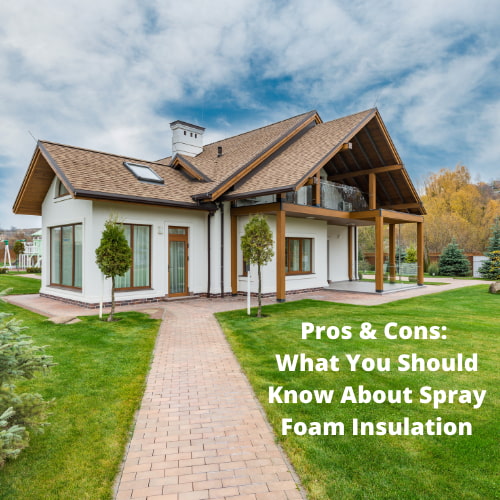
The Pluses of Spray Foam Attic Insulation
PLUS #1: SIGNIFICANT DECREASE IN UTILITY BILLS
When it comes to your building’s heating and cooling expenses, the spray foam method can save you a lot of money on your monthly energy bills by decreasing air infiltration. If you install this product in your entire home or business that does not currently have any insulation, the cost of energy savings is typically around 50%. When compared to other types of insulation, spray foam offers up to 30% lower energy consumption.
These numbers sound promising and specialists can actually vouch for this. If you want professional installation, the iFoam high-quality insulation services are just around the corner! They are always there to assist you through every step of planning, installation, and even maintenance.
PLUS #2: TOP-OF-THE-LINE AIRTIGHT SEAL
Spray foam insulation products can fill all of the cracks and wall cavities in your crawl spaces, attic, and walls preventing heat transfer. Air leakage from the exterior walls are typically one of the most costly expenditures that homeowners face since they result in huge energy loss.
This material is 24 times less permeable to airflow than other kinds of insulation, which means your home temperature stays securely mediated with no air leaks.
PLUS #3: SHIELD AGAINST MOLD, MILDEW, AND CONTAMINANTS
This insulation service is utilizing an inert polymer as the foam material. Even if it gets damp, mildew, mold, and bacteria will not be able to grow from this product because it does not provide a food source.
For this benefit, closed cell spray foam insulation is superior to open cell spray foam insulation, although both are superior to organic insulating materials. This insulation product has significantly fewer pest infestation and air contamination problems than the other various insulation products available on the market today. This leads to overall improved indoor air quality.
PLUS #4: WATER IMPERMEABILITY
Spray foam insulation offers homeowners two major benefits over traditional insulations. It will not only prevent moisture from entering your attic or crawl space, but it will also prevent water from collecting during a flood.
When properly installed and maintained according to the manufacturer’s instructions, this product will help your house endure far less damage during the building’s life.
PLUS #5: R-VALUE INTEGRITY
Although there may be potential problems with improper installation, this product will not lose R-value over time, which is a significant advantage.
3.5 inches of aged R-value is found in open cell foam, whereas closed-cell spray foam insulation can provide a higher r-value up to a 7 R-value per inch.
PLUS #6: A GREENER OPTION
When you’re concerned about the environmental effect of your home, spray foam insulation is the ideal choice for a variety of reasons.
It is environmentally beneficial, as it helps to cut energy use and avoid moisture damage. It reduces material usage and creates a product with fewer components in the first place by using fewer materials.
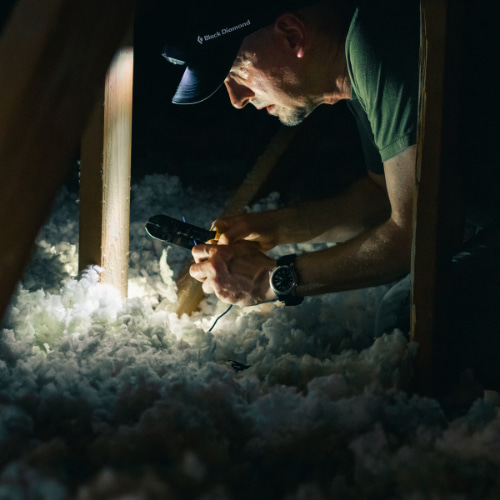
The Cons of Spray Foam Attic Insulation
FLAW #1: KNOWN TO POTENTIALLY SHRINK
The insulation can shrink with time, reducing the insulating properties it offers. Homes in areas where substantial temperature differences occur are more likely to suffer from this problem.
When the spray foam begins to pull away from the frame, other problems may develop. The only way to address this issue is to add more spray foam or remove the existing application and replace it with something fresh.
FLAW #2: NOT PERFECTLY VERSATILE WITH CAVITIES
Spray foam insulation, while being a flexible solution for improving home energy efficiency, is not a one-size-fits-all remedy that can fix everything. The expanding spray foam may miss parts of the walls, ceiling, or floor because there are sometimes holes where it does not reach as it expands.
When this problem occurs, the home may have temperature regulation issues and you can hear more of the noises outside.
FLAW #3: POTENTIAL HEALTH HAZARDS
“Isocyanates” are some of the key compounds in this product. When they come into contact with the lungs, eyes, or stomach, these chemical substances can irritate them.
Some individuals can experience edema, rashes, allergies, and inflammation after coming into contact with the foam. When working with this material, you must wear a respirator, goggles, and gloves.
FLAW #4: CAN BE A PRICEY OPTION
When it comes to cost, spray foam insulation cost is much more than fiberglass insulation. If you want the protection you need, expect to pay approximately $.40 per square foot for a fiberglass product.
If you choose the closed-cell spray polyurethane foam insulation, you may pay up to $1.50 per board foot.
FLAW #5: CAN INCUR WATER DAMAGE
If insulation installers overlook nooks, crannies and crevices while using a foam product, there’s an increased danger of water damage throughout the building’s life.
When the air enters the various pockets of the house, particularly those in the attic, pressure differences may cause water to seep in via building flaws.
This procedure may have a detrimental effect on the structure’s walls and roof.
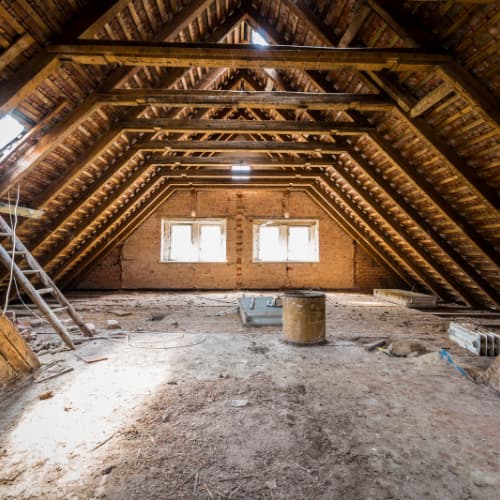
CONSIDER THESE AS YOU MAKE A DECISION
Here are some additional factors to think about before deciding on the kind of insulation to use in your house:
Bump up of home value: According to preliminary findings, spray foam may be a factor in the greater resale value of properties, owing largely to the product’s energy efficiency.
Cost efficiency: Spray foam claims to reduce energy costs by up to 50%. That’s a substantial annual cost saving when you consider the rapidly increasing energy cost.
Return on Investment: Here are some intriguing facts about the pay-off of spray foam usage in your home:
- The upfront and labor costs of spray foam insulation are usually reimbursed in less than three years. This implies that after three years, spray foam products will have paid for themselves by saving on energy bills.
- Foam insulation, rather than fiberglass batts, saves a homeowner over $1,000 in energy expenses.
Spray foam insulation is a great product and may be a better choice than batt insulation in your particular situation. It’s a good idea to use closed-cell foam insulation because it works particularly well. It has several advantages as well as drawbacks that should not be ignored.
They are mentioned above so always keep them in mind as you plan. In the end, the sort of insulation you choose will be determined by your application, overall cost, and wants. Always seek expert advice about technical information from insulation contractors and do your homework. Good luck!
You might be interested in these home improvement posts as well
- 11 Ways to Have More Energy Efficient Homes
- Consider These Before Residential Remodeling
- 7 Fantastic Cladding Ideas to Rejuvenate Your Home’s Exterior
Shop any of these stores and I receive a small commission at no cost to you.
 Ultimate Guide to Home Repa...Shop on Amazon
Ultimate Guide to Home Repa...Shop on Amazon Ultimate Guide: Plumbing, U...Shop on Amazon
Ultimate Guide: Plumbing, U...Shop on Amazon Echo Dot (3rd Gen, 2018 rel...Shop on Amazon
Echo Dot (3rd Gen, 2018 rel...Shop on Amazon SMIRLY Charcuterie Board Se...Shop on Amazon
SMIRLY Charcuterie Board Se...Shop on Amazon Made for Living: Collected ...Shop on Amazon
Made for Living: Collected ...Shop on Amazon
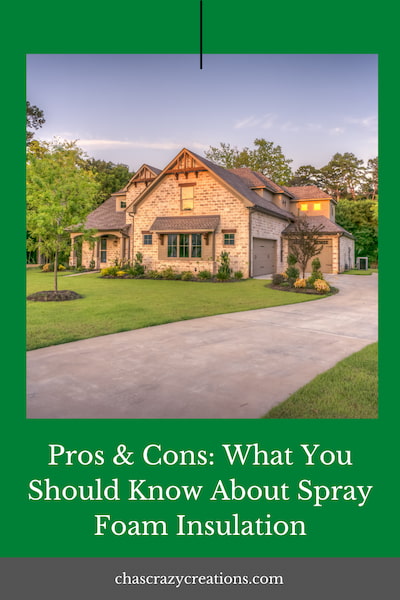


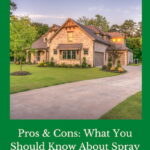




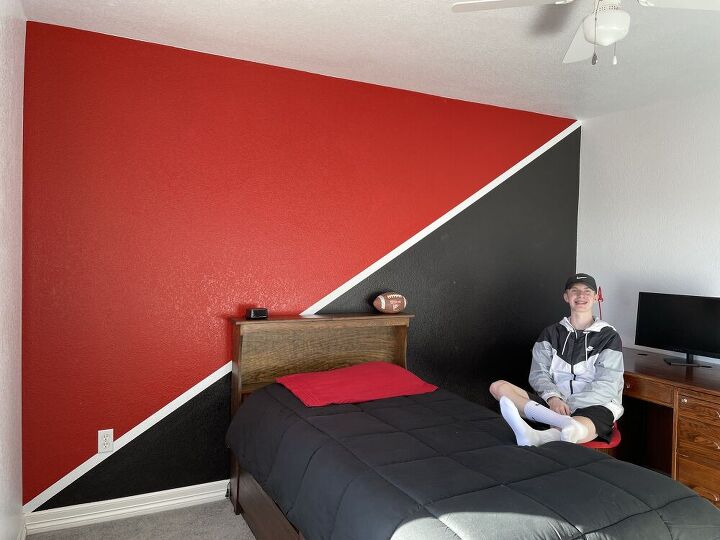

The fact that spray foam insulation has a lot of water impermeability impresses me a lot. Water and moisture have been the cause of most of my home’s problems, so preventing those issues as much as possible could benefit me in the long run. I’ll ask an insulation expert to help me out with this so our home is more protected against those kinds of things.
I’m really glad you said that spray foam insulation can help you save up to 50% on your energy bills. My husband and I need to look into choosing insulation for our custom home being built at the end of this month, so I wanted to do research on the different types to choose from. I appreciate you helping me learn more about the advantages of spray foam insulation.